A Deep Dive into Values, Culture, Ethics, and the Concept of Truth
VerifiedAdded on 2023/04/20
|10
|3308
|87
Essay
AI Summary
This essay delves into the intricate relationship between values, culture, ethics, and truth, exploring various philosophical perspectives and theories. It begins by defining ethics as moral principles guiding behavior and emphasizes its importance in resolving dilemmas and disagreements. The essay then transitions to a discussion of truth, highlighting the challenges in defining it and the influence of beliefs and knowledge on individual perceptions. It further examines the concept of beauty and its subjective nature. The essay also discusses moral realism and subjectivism in ethics, referencing Simon de Beauvoir's perspective on life and personal choices. The essay concludes by emphasizing the complex interplay of personal choices and external factors in shaping an individual's life and understanding of truth. The website Desklib provides more solved assignments and study resources for students.
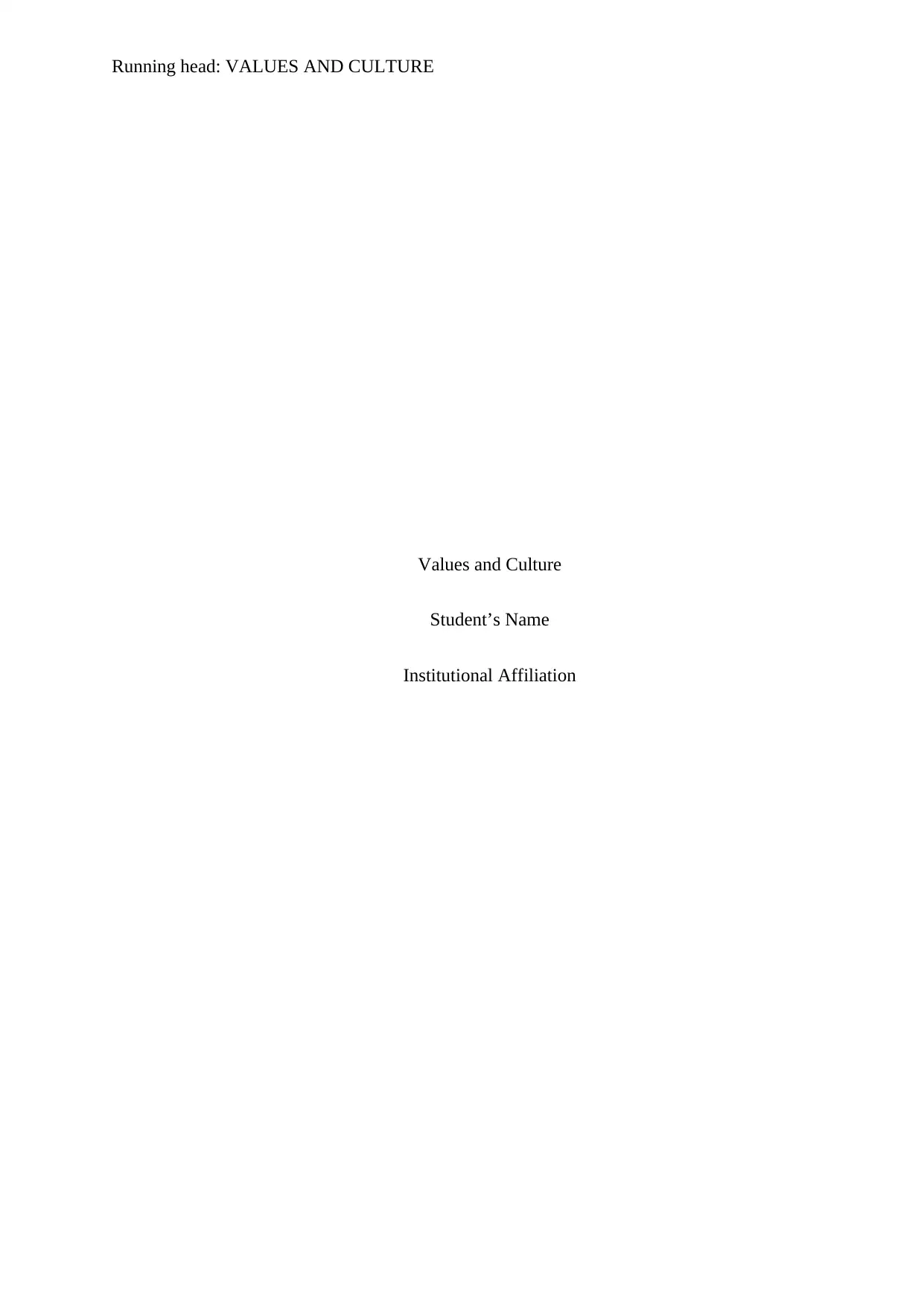
Running head: VALUES AND CULTURE
Values and Culture
Student’s Name
Institutional Affiliation
Values and Culture
Student’s Name
Institutional Affiliation
Paraphrase This Document
Need a fresh take? Get an instant paraphrase of this document with our AI Paraphraser
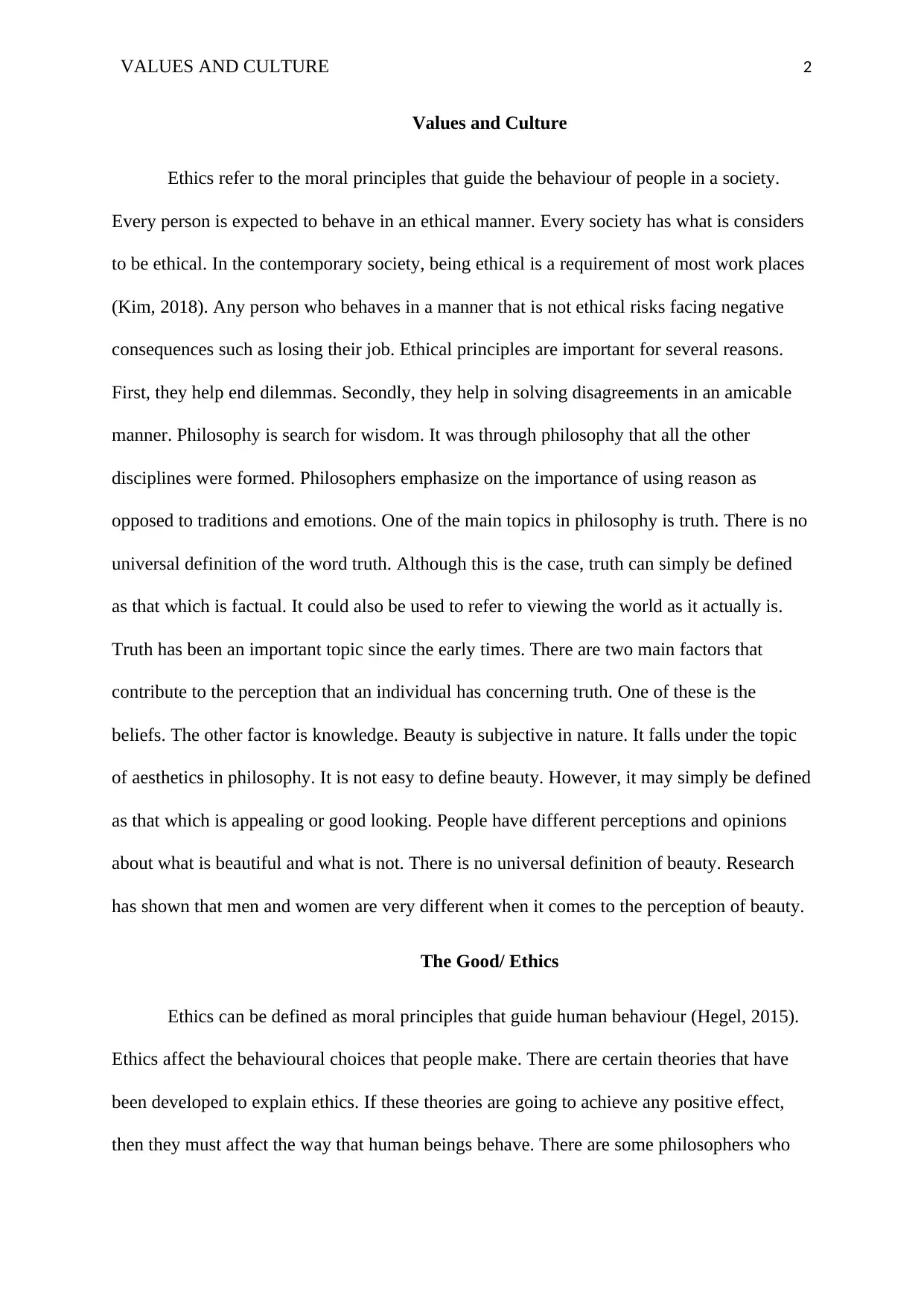
VALUES AND CULTURE 2
Values and Culture
Ethics refer to the moral principles that guide the behaviour of people in a society.
Every person is expected to behave in an ethical manner. Every society has what is considers
to be ethical. In the contemporary society, being ethical is a requirement of most work places
(Kim, 2018). Any person who behaves in a manner that is not ethical risks facing negative
consequences such as losing their job. Ethical principles are important for several reasons.
First, they help end dilemmas. Secondly, they help in solving disagreements in an amicable
manner. Philosophy is search for wisdom. It was through philosophy that all the other
disciplines were formed. Philosophers emphasize on the importance of using reason as
opposed to traditions and emotions. One of the main topics in philosophy is truth. There is no
universal definition of the word truth. Although this is the case, truth can simply be defined
as that which is factual. It could also be used to refer to viewing the world as it actually is.
Truth has been an important topic since the early times. There are two main factors that
contribute to the perception that an individual has concerning truth. One of these is the
beliefs. The other factor is knowledge. Beauty is subjective in nature. It falls under the topic
of aesthetics in philosophy. It is not easy to define beauty. However, it may simply be defined
as that which is appealing or good looking. People have different perceptions and opinions
about what is beautiful and what is not. There is no universal definition of beauty. Research
has shown that men and women are very different when it comes to the perception of beauty.
The Good/ Ethics
Ethics can be defined as moral principles that guide human behaviour (Hegel, 2015).
Ethics affect the behavioural choices that people make. There are certain theories that have
been developed to explain ethics. If these theories are going to achieve any positive effect,
then they must affect the way that human beings behave. There are some philosophers who
Values and Culture
Ethics refer to the moral principles that guide the behaviour of people in a society.
Every person is expected to behave in an ethical manner. Every society has what is considers
to be ethical. In the contemporary society, being ethical is a requirement of most work places
(Kim, 2018). Any person who behaves in a manner that is not ethical risks facing negative
consequences such as losing their job. Ethical principles are important for several reasons.
First, they help end dilemmas. Secondly, they help in solving disagreements in an amicable
manner. Philosophy is search for wisdom. It was through philosophy that all the other
disciplines were formed. Philosophers emphasize on the importance of using reason as
opposed to traditions and emotions. One of the main topics in philosophy is truth. There is no
universal definition of the word truth. Although this is the case, truth can simply be defined
as that which is factual. It could also be used to refer to viewing the world as it actually is.
Truth has been an important topic since the early times. There are two main factors that
contribute to the perception that an individual has concerning truth. One of these is the
beliefs. The other factor is knowledge. Beauty is subjective in nature. It falls under the topic
of aesthetics in philosophy. It is not easy to define beauty. However, it may simply be defined
as that which is appealing or good looking. People have different perceptions and opinions
about what is beautiful and what is not. There is no universal definition of beauty. Research
has shown that men and women are very different when it comes to the perception of beauty.
The Good/ Ethics
Ethics can be defined as moral principles that guide human behaviour (Hegel, 2015).
Ethics affect the behavioural choices that people make. There are certain theories that have
been developed to explain ethics. If these theories are going to achieve any positive effect,
then they must affect the way that human beings behave. There are some philosophers who
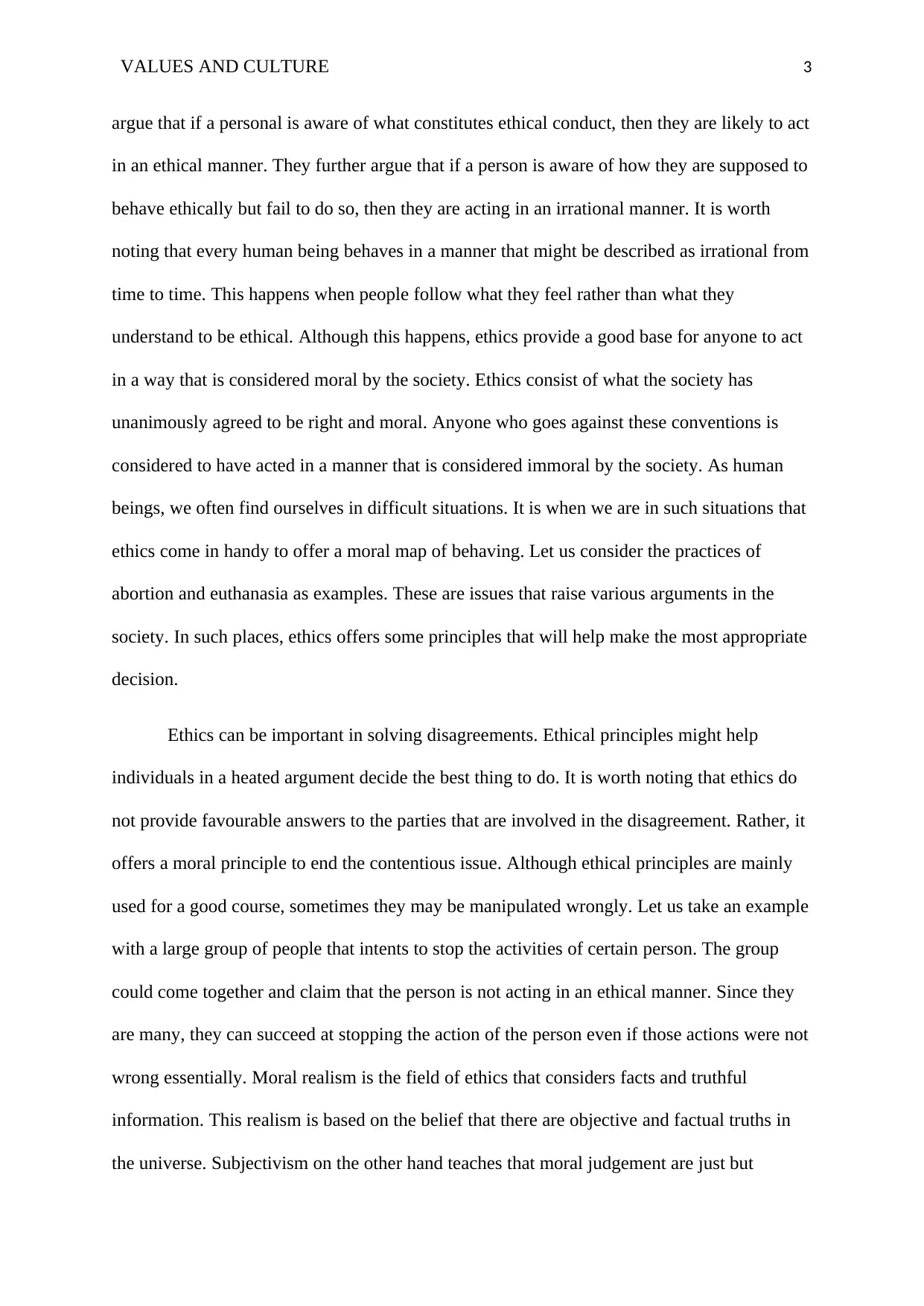
VALUES AND CULTURE 3
argue that if a personal is aware of what constitutes ethical conduct, then they are likely to act
in an ethical manner. They further argue that if a person is aware of how they are supposed to
behave ethically but fail to do so, then they are acting in an irrational manner. It is worth
noting that every human being behaves in a manner that might be described as irrational from
time to time. This happens when people follow what they feel rather than what they
understand to be ethical. Although this happens, ethics provide a good base for anyone to act
in a way that is considered moral by the society. Ethics consist of what the society has
unanimously agreed to be right and moral. Anyone who goes against these conventions is
considered to have acted in a manner that is considered immoral by the society. As human
beings, we often find ourselves in difficult situations. It is when we are in such situations that
ethics come in handy to offer a moral map of behaving. Let us consider the practices of
abortion and euthanasia as examples. These are issues that raise various arguments in the
society. In such places, ethics offers some principles that will help make the most appropriate
decision.
Ethics can be important in solving disagreements. Ethical principles might help
individuals in a heated argument decide the best thing to do. It is worth noting that ethics do
not provide favourable answers to the parties that are involved in the disagreement. Rather, it
offers a moral principle to end the contentious issue. Although ethical principles are mainly
used for a good course, sometimes they may be manipulated wrongly. Let us take an example
with a large group of people that intents to stop the activities of certain person. The group
could come together and claim that the person is not acting in an ethical manner. Since they
are many, they can succeed at stopping the action of the person even if those actions were not
wrong essentially. Moral realism is the field of ethics that considers facts and truthful
information. This realism is based on the belief that there are objective and factual truths in
the universe. Subjectivism on the other hand teaches that moral judgement are just but
argue that if a personal is aware of what constitutes ethical conduct, then they are likely to act
in an ethical manner. They further argue that if a person is aware of how they are supposed to
behave ethically but fail to do so, then they are acting in an irrational manner. It is worth
noting that every human being behaves in a manner that might be described as irrational from
time to time. This happens when people follow what they feel rather than what they
understand to be ethical. Although this happens, ethics provide a good base for anyone to act
in a way that is considered moral by the society. Ethics consist of what the society has
unanimously agreed to be right and moral. Anyone who goes against these conventions is
considered to have acted in a manner that is considered immoral by the society. As human
beings, we often find ourselves in difficult situations. It is when we are in such situations that
ethics come in handy to offer a moral map of behaving. Let us consider the practices of
abortion and euthanasia as examples. These are issues that raise various arguments in the
society. In such places, ethics offers some principles that will help make the most appropriate
decision.
Ethics can be important in solving disagreements. Ethical principles might help
individuals in a heated argument decide the best thing to do. It is worth noting that ethics do
not provide favourable answers to the parties that are involved in the disagreement. Rather, it
offers a moral principle to end the contentious issue. Although ethical principles are mainly
used for a good course, sometimes they may be manipulated wrongly. Let us take an example
with a large group of people that intents to stop the activities of certain person. The group
could come together and claim that the person is not acting in an ethical manner. Since they
are many, they can succeed at stopping the action of the person even if those actions were not
wrong essentially. Moral realism is the field of ethics that considers facts and truthful
information. This realism is based on the belief that there are objective and factual truths in
the universe. Subjectivism on the other hand teaches that moral judgement are just but
⊘ This is a preview!⊘
Do you want full access?
Subscribe today to unlock all pages.

Trusted by 1+ million students worldwide
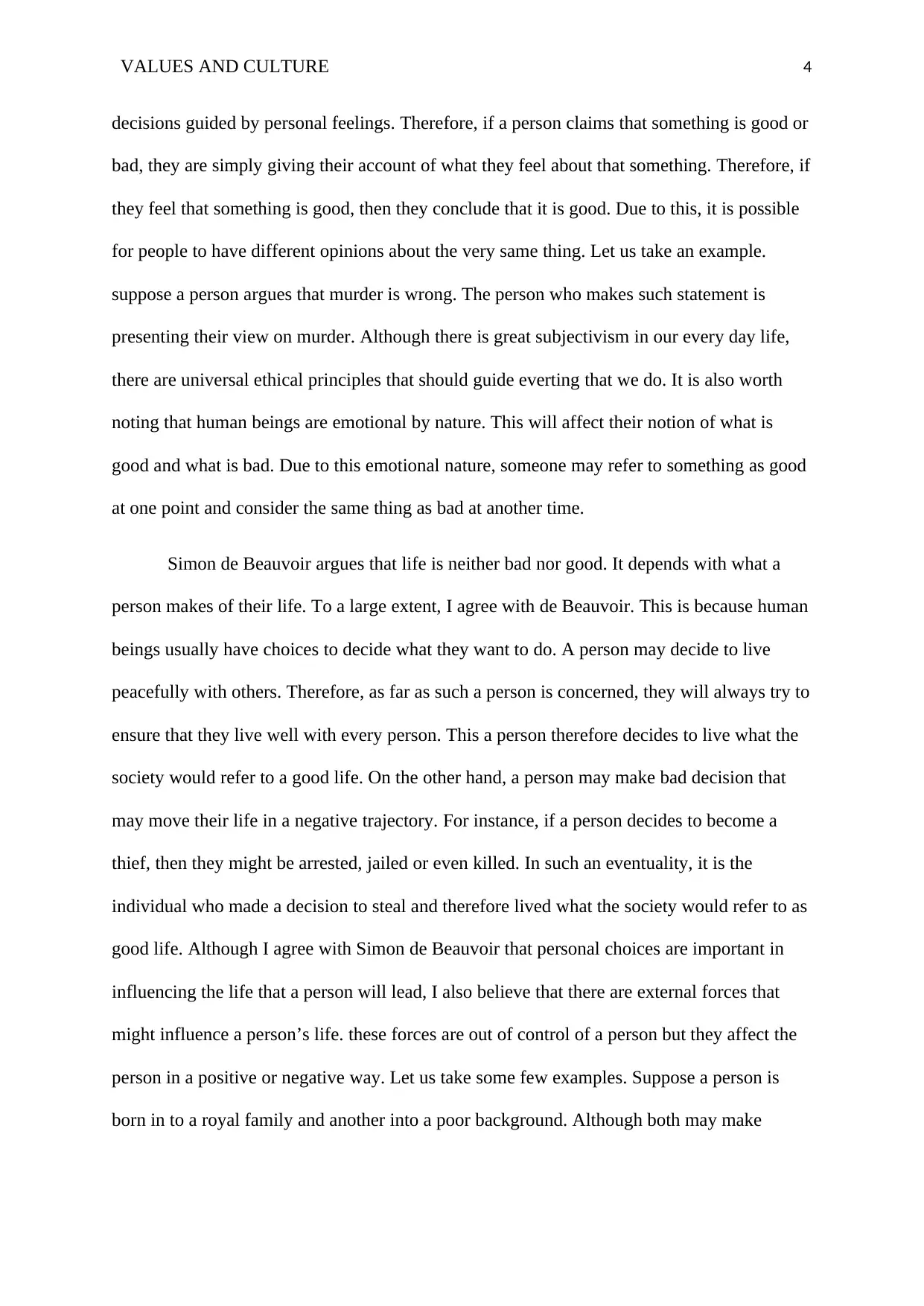
VALUES AND CULTURE 4
decisions guided by personal feelings. Therefore, if a person claims that something is good or
bad, they are simply giving their account of what they feel about that something. Therefore, if
they feel that something is good, then they conclude that it is good. Due to this, it is possible
for people to have different opinions about the very same thing. Let us take an example.
suppose a person argues that murder is wrong. The person who makes such statement is
presenting their view on murder. Although there is great subjectivism in our every day life,
there are universal ethical principles that should guide everting that we do. It is also worth
noting that human beings are emotional by nature. This will affect their notion of what is
good and what is bad. Due to this emotional nature, someone may refer to something as good
at one point and consider the same thing as bad at another time.
Simon de Beauvoir argues that life is neither bad nor good. It depends with what a
person makes of their life. To a large extent, I agree with de Beauvoir. This is because human
beings usually have choices to decide what they want to do. A person may decide to live
peacefully with others. Therefore, as far as such a person is concerned, they will always try to
ensure that they live well with every person. This a person therefore decides to live what the
society would refer to a good life. On the other hand, a person may make bad decision that
may move their life in a negative trajectory. For instance, if a person decides to become a
thief, then they might be arrested, jailed or even killed. In such an eventuality, it is the
individual who made a decision to steal and therefore lived what the society would refer to as
good life. Although I agree with Simon de Beauvoir that personal choices are important in
influencing the life that a person will lead, I also believe that there are external forces that
might influence a person’s life. these forces are out of control of a person but they affect the
person in a positive or negative way. Let us take some few examples. Suppose a person is
born in to a royal family and another into a poor background. Although both may make
decisions guided by personal feelings. Therefore, if a person claims that something is good or
bad, they are simply giving their account of what they feel about that something. Therefore, if
they feel that something is good, then they conclude that it is good. Due to this, it is possible
for people to have different opinions about the very same thing. Let us take an example.
suppose a person argues that murder is wrong. The person who makes such statement is
presenting their view on murder. Although there is great subjectivism in our every day life,
there are universal ethical principles that should guide everting that we do. It is also worth
noting that human beings are emotional by nature. This will affect their notion of what is
good and what is bad. Due to this emotional nature, someone may refer to something as good
at one point and consider the same thing as bad at another time.
Simon de Beauvoir argues that life is neither bad nor good. It depends with what a
person makes of their life. To a large extent, I agree with de Beauvoir. This is because human
beings usually have choices to decide what they want to do. A person may decide to live
peacefully with others. Therefore, as far as such a person is concerned, they will always try to
ensure that they live well with every person. This a person therefore decides to live what the
society would refer to a good life. On the other hand, a person may make bad decision that
may move their life in a negative trajectory. For instance, if a person decides to become a
thief, then they might be arrested, jailed or even killed. In such an eventuality, it is the
individual who made a decision to steal and therefore lived what the society would refer to as
good life. Although I agree with Simon de Beauvoir that personal choices are important in
influencing the life that a person will lead, I also believe that there are external forces that
might influence a person’s life. these forces are out of control of a person but they affect the
person in a positive or negative way. Let us take some few examples. Suppose a person is
born in to a royal family and another into a poor background. Although both may make
Paraphrase This Document
Need a fresh take? Get an instant paraphrase of this document with our AI Paraphraser
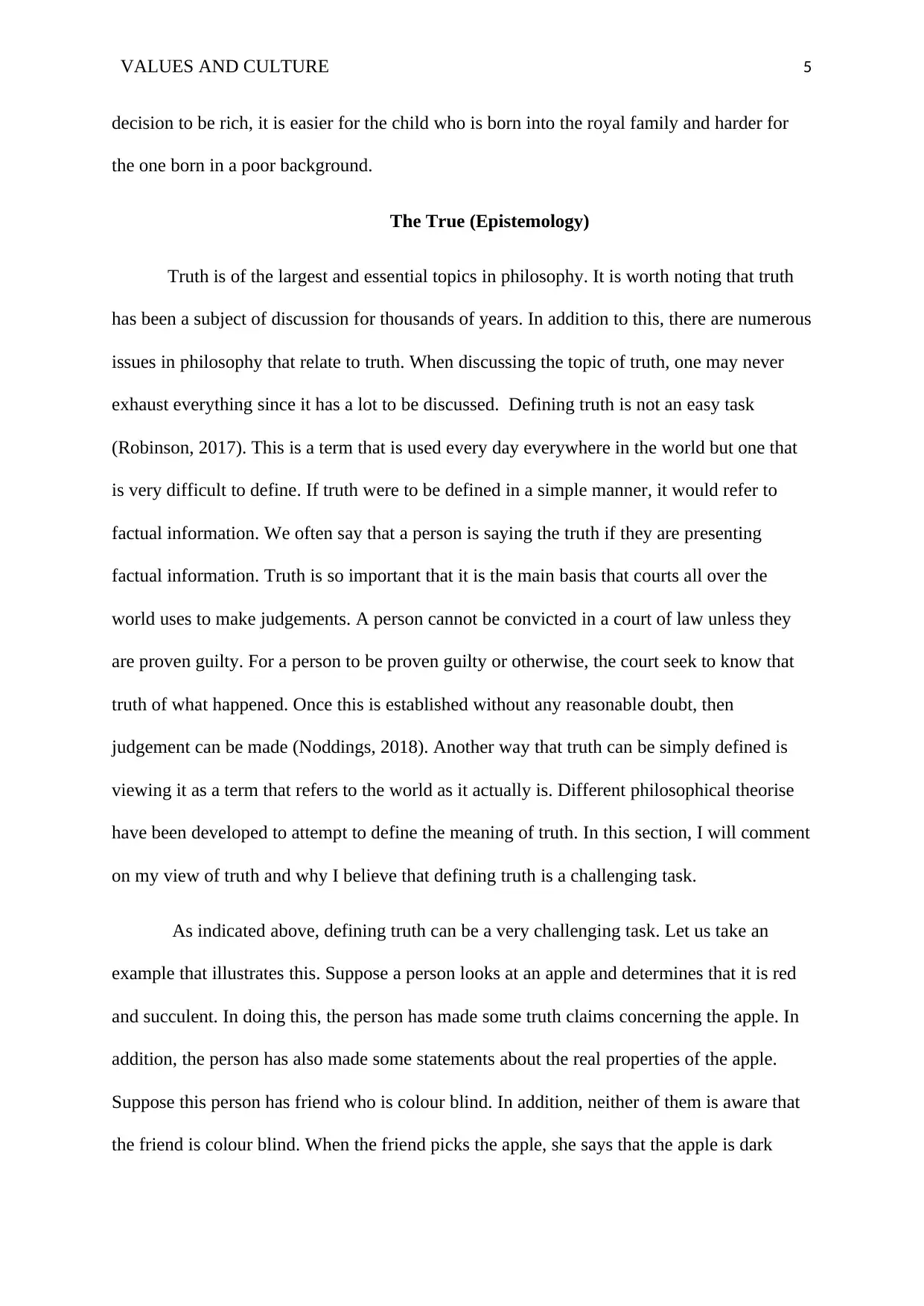
VALUES AND CULTURE 5
decision to be rich, it is easier for the child who is born into the royal family and harder for
the one born in a poor background.
The True (Epistemology)
Truth is of the largest and essential topics in philosophy. It is worth noting that truth
has been a subject of discussion for thousands of years. In addition to this, there are numerous
issues in philosophy that relate to truth. When discussing the topic of truth, one may never
exhaust everything since it has a lot to be discussed. Defining truth is not an easy task
(Robinson, 2017). This is a term that is used every day everywhere in the world but one that
is very difficult to define. If truth were to be defined in a simple manner, it would refer to
factual information. We often say that a person is saying the truth if they are presenting
factual information. Truth is so important that it is the main basis that courts all over the
world uses to make judgements. A person cannot be convicted in a court of law unless they
are proven guilty. For a person to be proven guilty or otherwise, the court seek to know that
truth of what happened. Once this is established without any reasonable doubt, then
judgement can be made (Noddings, 2018). Another way that truth can be simply defined is
viewing it as a term that refers to the world as it actually is. Different philosophical theorise
have been developed to attempt to define the meaning of truth. In this section, I will comment
on my view of truth and why I believe that defining truth is a challenging task.
As indicated above, defining truth can be a very challenging task. Let us take an
example that illustrates this. Suppose a person looks at an apple and determines that it is red
and succulent. In doing this, the person has made some truth claims concerning the apple. In
addition, the person has also made some statements about the real properties of the apple.
Suppose this person has friend who is colour blind. In addition, neither of them is aware that
the friend is colour blind. When the friend picks the apple, she says that the apple is dark
decision to be rich, it is easier for the child who is born into the royal family and harder for
the one born in a poor background.
The True (Epistemology)
Truth is of the largest and essential topics in philosophy. It is worth noting that truth
has been a subject of discussion for thousands of years. In addition to this, there are numerous
issues in philosophy that relate to truth. When discussing the topic of truth, one may never
exhaust everything since it has a lot to be discussed. Defining truth is not an easy task
(Robinson, 2017). This is a term that is used every day everywhere in the world but one that
is very difficult to define. If truth were to be defined in a simple manner, it would refer to
factual information. We often say that a person is saying the truth if they are presenting
factual information. Truth is so important that it is the main basis that courts all over the
world uses to make judgements. A person cannot be convicted in a court of law unless they
are proven guilty. For a person to be proven guilty or otherwise, the court seek to know that
truth of what happened. Once this is established without any reasonable doubt, then
judgement can be made (Noddings, 2018). Another way that truth can be simply defined is
viewing it as a term that refers to the world as it actually is. Different philosophical theorise
have been developed to attempt to define the meaning of truth. In this section, I will comment
on my view of truth and why I believe that defining truth is a challenging task.
As indicated above, defining truth can be a very challenging task. Let us take an
example that illustrates this. Suppose a person looks at an apple and determines that it is red
and succulent. In doing this, the person has made some truth claims concerning the apple. In
addition, the person has also made some statements about the real properties of the apple.
Suppose this person has friend who is colour blind. In addition, neither of them is aware that
the friend is colour blind. When the friend picks the apple, she says that the apple is dark
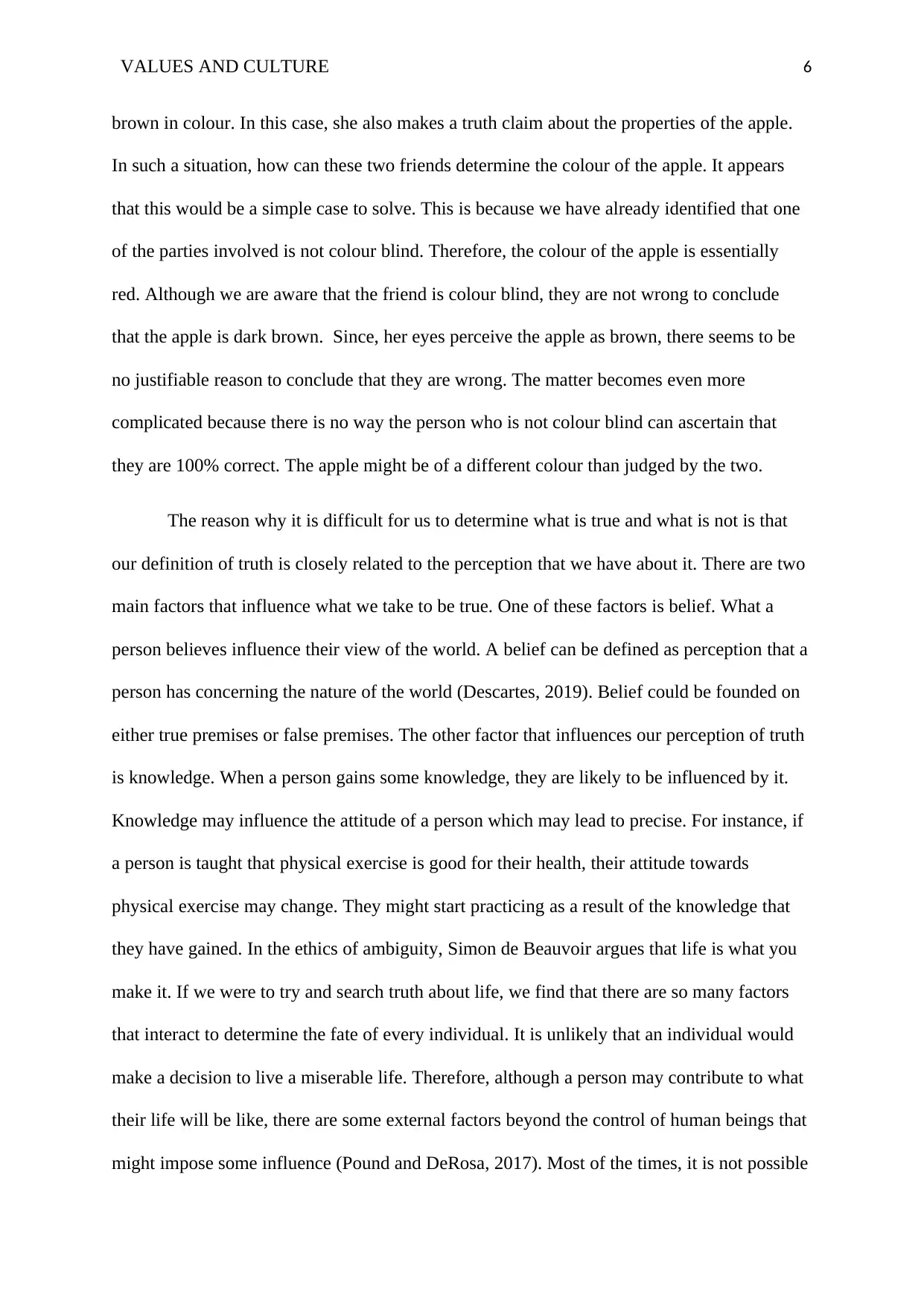
VALUES AND CULTURE 6
brown in colour. In this case, she also makes a truth claim about the properties of the apple.
In such a situation, how can these two friends determine the colour of the apple. It appears
that this would be a simple case to solve. This is because we have already identified that one
of the parties involved is not colour blind. Therefore, the colour of the apple is essentially
red. Although we are aware that the friend is colour blind, they are not wrong to conclude
that the apple is dark brown. Since, her eyes perceive the apple as brown, there seems to be
no justifiable reason to conclude that they are wrong. The matter becomes even more
complicated because there is no way the person who is not colour blind can ascertain that
they are 100% correct. The apple might be of a different colour than judged by the two.
The reason why it is difficult for us to determine what is true and what is not is that
our definition of truth is closely related to the perception that we have about it. There are two
main factors that influence what we take to be true. One of these factors is belief. What a
person believes influence their view of the world. A belief can be defined as perception that a
person has concerning the nature of the world (Descartes, 2019). Belief could be founded on
either true premises or false premises. The other factor that influences our perception of truth
is knowledge. When a person gains some knowledge, they are likely to be influenced by it.
Knowledge may influence the attitude of a person which may lead to precise. For instance, if
a person is taught that physical exercise is good for their health, their attitude towards
physical exercise may change. They might start practicing as a result of the knowledge that
they have gained. In the ethics of ambiguity, Simon de Beauvoir argues that life is what you
make it. If we were to try and search truth about life, we find that there are so many factors
that interact to determine the fate of every individual. It is unlikely that an individual would
make a decision to live a miserable life. Therefore, although a person may contribute to what
their life will be like, there are some external factors beyond the control of human beings that
might impose some influence (Pound and DeRosa, 2017). Most of the times, it is not possible
brown in colour. In this case, she also makes a truth claim about the properties of the apple.
In such a situation, how can these two friends determine the colour of the apple. It appears
that this would be a simple case to solve. This is because we have already identified that one
of the parties involved is not colour blind. Therefore, the colour of the apple is essentially
red. Although we are aware that the friend is colour blind, they are not wrong to conclude
that the apple is dark brown. Since, her eyes perceive the apple as brown, there seems to be
no justifiable reason to conclude that they are wrong. The matter becomes even more
complicated because there is no way the person who is not colour blind can ascertain that
they are 100% correct. The apple might be of a different colour than judged by the two.
The reason why it is difficult for us to determine what is true and what is not is that
our definition of truth is closely related to the perception that we have about it. There are two
main factors that influence what we take to be true. One of these factors is belief. What a
person believes influence their view of the world. A belief can be defined as perception that a
person has concerning the nature of the world (Descartes, 2019). Belief could be founded on
either true premises or false premises. The other factor that influences our perception of truth
is knowledge. When a person gains some knowledge, they are likely to be influenced by it.
Knowledge may influence the attitude of a person which may lead to precise. For instance, if
a person is taught that physical exercise is good for their health, their attitude towards
physical exercise may change. They might start practicing as a result of the knowledge that
they have gained. In the ethics of ambiguity, Simon de Beauvoir argues that life is what you
make it. If we were to try and search truth about life, we find that there are so many factors
that interact to determine the fate of every individual. It is unlikely that an individual would
make a decision to live a miserable life. Therefore, although a person may contribute to what
their life will be like, there are some external factors beyond the control of human beings that
might impose some influence (Pound and DeRosa, 2017). Most of the times, it is not possible
⊘ This is a preview!⊘
Do you want full access?
Subscribe today to unlock all pages.

Trusted by 1+ million students worldwide
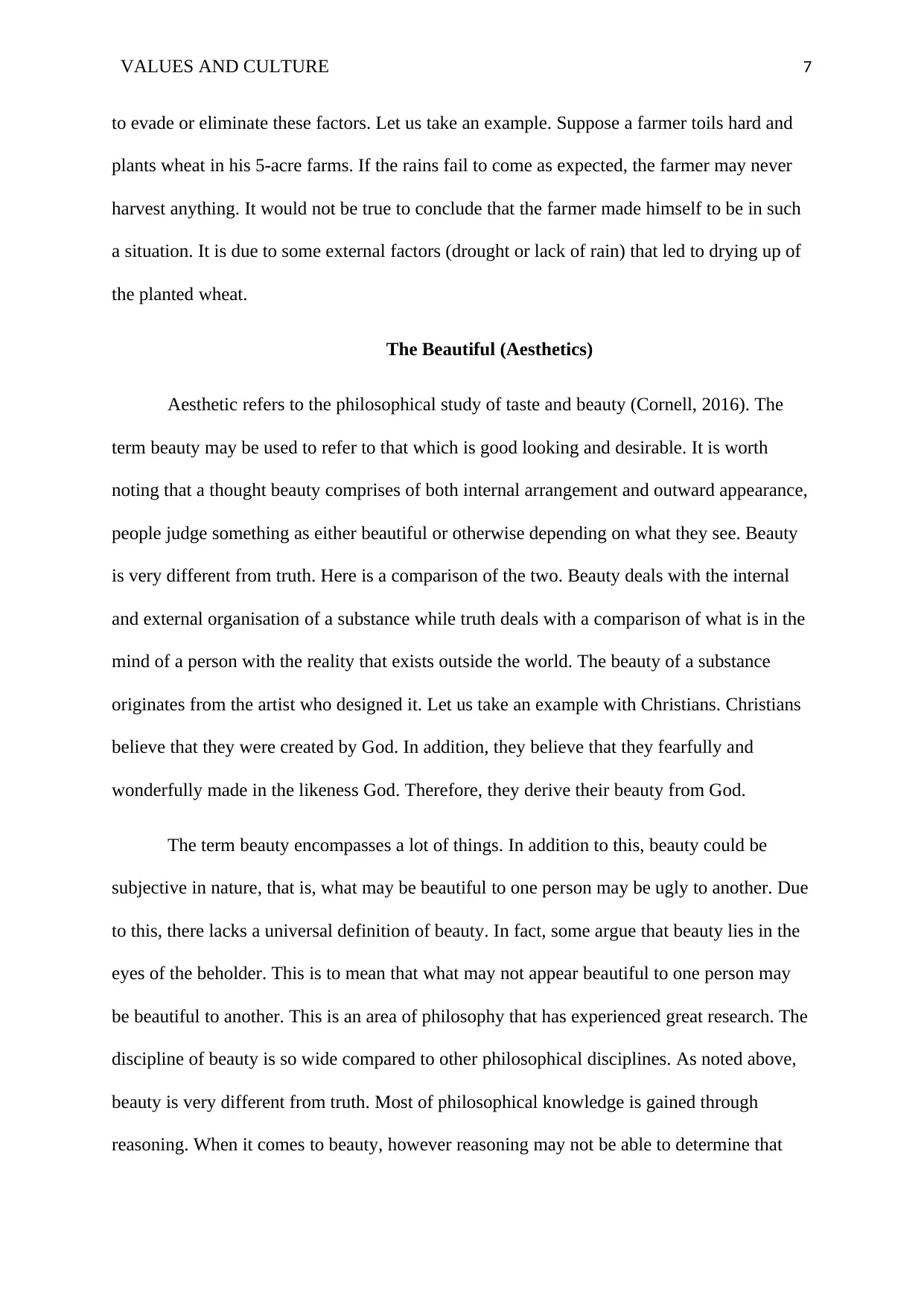
VALUES AND CULTURE 7
to evade or eliminate these factors. Let us take an example. Suppose a farmer toils hard and
plants wheat in his 5-acre farms. If the rains fail to come as expected, the farmer may never
harvest anything. It would not be true to conclude that the farmer made himself to be in such
a situation. It is due to some external factors (drought or lack of rain) that led to drying up of
the planted wheat.
The Beautiful (Aesthetics)
Aesthetic refers to the philosophical study of taste and beauty (Cornell, 2016). The
term beauty may be used to refer to that which is good looking and desirable. It is worth
noting that a thought beauty comprises of both internal arrangement and outward appearance,
people judge something as either beautiful or otherwise depending on what they see. Beauty
is very different from truth. Here is a comparison of the two. Beauty deals with the internal
and external organisation of a substance while truth deals with a comparison of what is in the
mind of a person with the reality that exists outside the world. The beauty of a substance
originates from the artist who designed it. Let us take an example with Christians. Christians
believe that they were created by God. In addition, they believe that they fearfully and
wonderfully made in the likeness God. Therefore, they derive their beauty from God.
The term beauty encompasses a lot of things. In addition to this, beauty could be
subjective in nature, that is, what may be beautiful to one person may be ugly to another. Due
to this, there lacks a universal definition of beauty. In fact, some argue that beauty lies in the
eyes of the beholder. This is to mean that what may not appear beautiful to one person may
be beautiful to another. This is an area of philosophy that has experienced great research. The
discipline of beauty is so wide compared to other philosophical disciplines. As noted above,
beauty is very different from truth. Most of philosophical knowledge is gained through
reasoning. When it comes to beauty, however reasoning may not be able to determine that
to evade or eliminate these factors. Let us take an example. Suppose a farmer toils hard and
plants wheat in his 5-acre farms. If the rains fail to come as expected, the farmer may never
harvest anything. It would not be true to conclude that the farmer made himself to be in such
a situation. It is due to some external factors (drought or lack of rain) that led to drying up of
the planted wheat.
The Beautiful (Aesthetics)
Aesthetic refers to the philosophical study of taste and beauty (Cornell, 2016). The
term beauty may be used to refer to that which is good looking and desirable. It is worth
noting that a thought beauty comprises of both internal arrangement and outward appearance,
people judge something as either beautiful or otherwise depending on what they see. Beauty
is very different from truth. Here is a comparison of the two. Beauty deals with the internal
and external organisation of a substance while truth deals with a comparison of what is in the
mind of a person with the reality that exists outside the world. The beauty of a substance
originates from the artist who designed it. Let us take an example with Christians. Christians
believe that they were created by God. In addition, they believe that they fearfully and
wonderfully made in the likeness God. Therefore, they derive their beauty from God.
The term beauty encompasses a lot of things. In addition to this, beauty could be
subjective in nature, that is, what may be beautiful to one person may be ugly to another. Due
to this, there lacks a universal definition of beauty. In fact, some argue that beauty lies in the
eyes of the beholder. This is to mean that what may not appear beautiful to one person may
be beautiful to another. This is an area of philosophy that has experienced great research. The
discipline of beauty is so wide compared to other philosophical disciplines. As noted above,
beauty is very different from truth. Most of philosophical knowledge is gained through
reasoning. When it comes to beauty, however reasoning may not be able to determine that
Paraphrase This Document
Need a fresh take? Get an instant paraphrase of this document with our AI Paraphraser
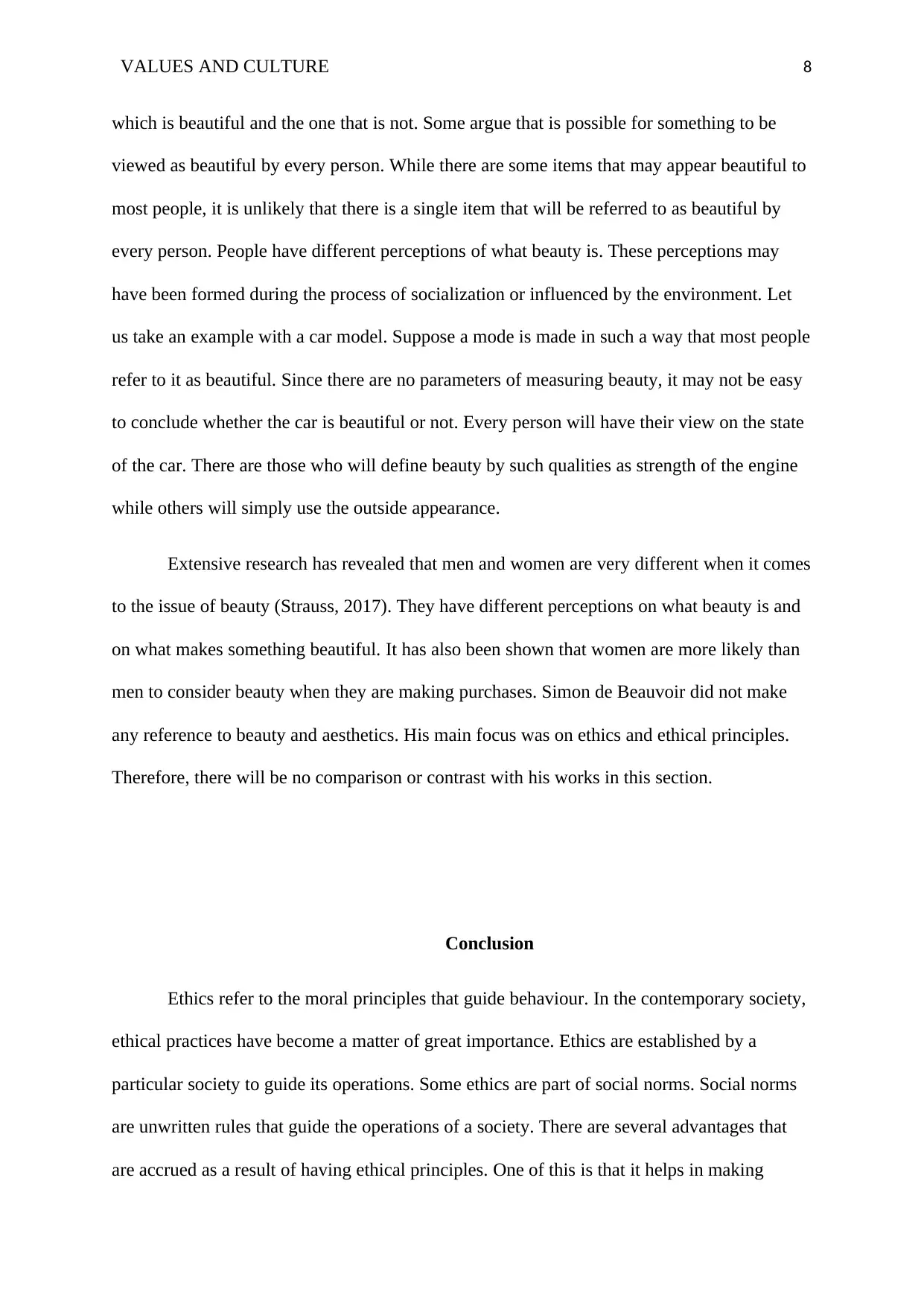
VALUES AND CULTURE 8
which is beautiful and the one that is not. Some argue that is possible for something to be
viewed as beautiful by every person. While there are some items that may appear beautiful to
most people, it is unlikely that there is a single item that will be referred to as beautiful by
every person. People have different perceptions of what beauty is. These perceptions may
have been formed during the process of socialization or influenced by the environment. Let
us take an example with a car model. Suppose a mode is made in such a way that most people
refer to it as beautiful. Since there are no parameters of measuring beauty, it may not be easy
to conclude whether the car is beautiful or not. Every person will have their view on the state
of the car. There are those who will define beauty by such qualities as strength of the engine
while others will simply use the outside appearance.
Extensive research has revealed that men and women are very different when it comes
to the issue of beauty (Strauss, 2017). They have different perceptions on what beauty is and
on what makes something beautiful. It has also been shown that women are more likely than
men to consider beauty when they are making purchases. Simon de Beauvoir did not make
any reference to beauty and aesthetics. His main focus was on ethics and ethical principles.
Therefore, there will be no comparison or contrast with his works in this section.
Conclusion
Ethics refer to the moral principles that guide behaviour. In the contemporary society,
ethical practices have become a matter of great importance. Ethics are established by a
particular society to guide its operations. Some ethics are part of social norms. Social norms
are unwritten rules that guide the operations of a society. There are several advantages that
are accrued as a result of having ethical principles. One of this is that it helps in making
which is beautiful and the one that is not. Some argue that is possible for something to be
viewed as beautiful by every person. While there are some items that may appear beautiful to
most people, it is unlikely that there is a single item that will be referred to as beautiful by
every person. People have different perceptions of what beauty is. These perceptions may
have been formed during the process of socialization or influenced by the environment. Let
us take an example with a car model. Suppose a mode is made in such a way that most people
refer to it as beautiful. Since there are no parameters of measuring beauty, it may not be easy
to conclude whether the car is beautiful or not. Every person will have their view on the state
of the car. There are those who will define beauty by such qualities as strength of the engine
while others will simply use the outside appearance.
Extensive research has revealed that men and women are very different when it comes
to the issue of beauty (Strauss, 2017). They have different perceptions on what beauty is and
on what makes something beautiful. It has also been shown that women are more likely than
men to consider beauty when they are making purchases. Simon de Beauvoir did not make
any reference to beauty and aesthetics. His main focus was on ethics and ethical principles.
Therefore, there will be no comparison or contrast with his works in this section.
Conclusion
Ethics refer to the moral principles that guide behaviour. In the contemporary society,
ethical practices have become a matter of great importance. Ethics are established by a
particular society to guide its operations. Some ethics are part of social norms. Social norms
are unwritten rules that guide the operations of a society. There are several advantages that
are accrued as a result of having ethical principles. One of this is that it helps in making
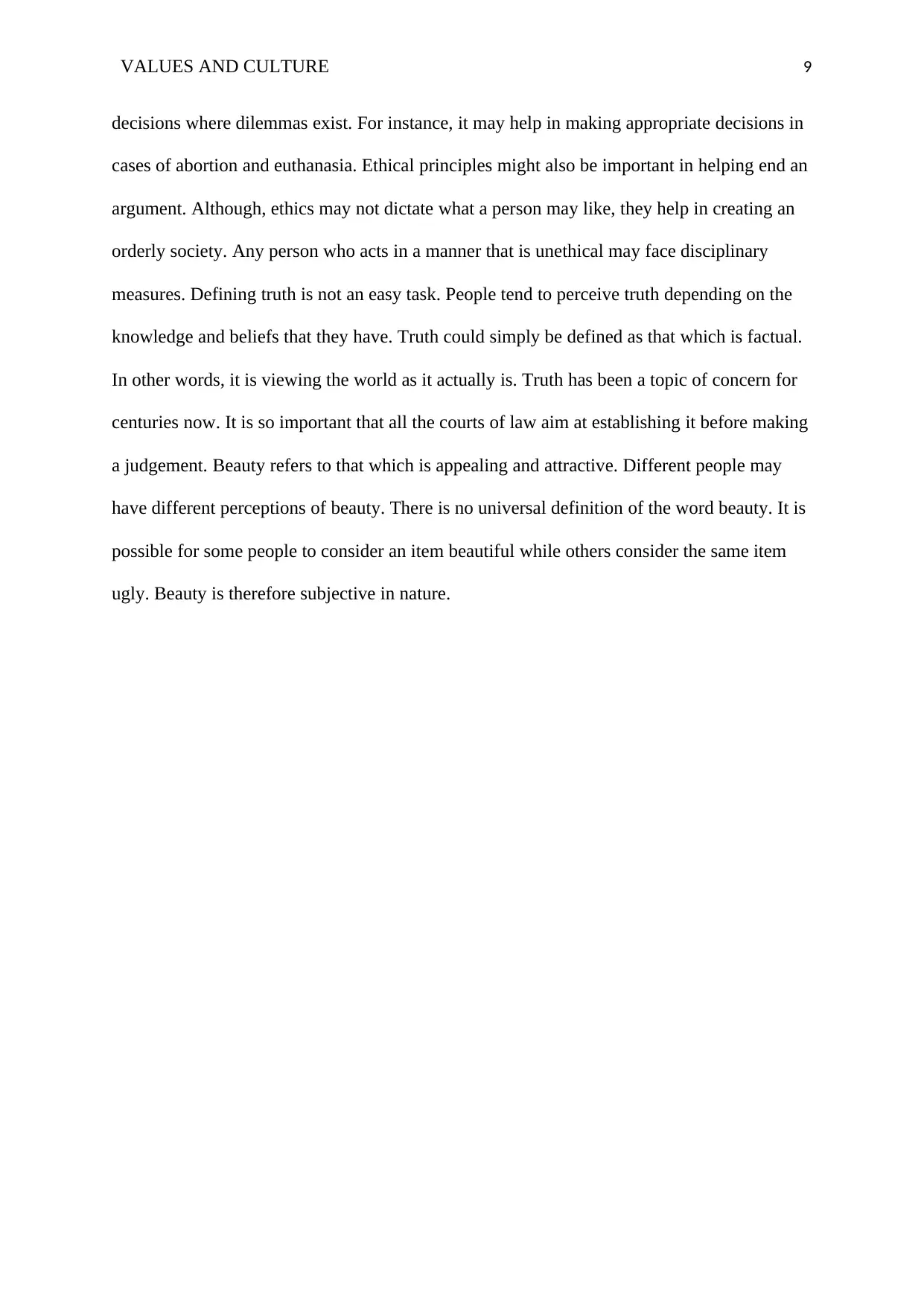
VALUES AND CULTURE 9
decisions where dilemmas exist. For instance, it may help in making appropriate decisions in
cases of abortion and euthanasia. Ethical principles might also be important in helping end an
argument. Although, ethics may not dictate what a person may like, they help in creating an
orderly society. Any person who acts in a manner that is unethical may face disciplinary
measures. Defining truth is not an easy task. People tend to perceive truth depending on the
knowledge and beliefs that they have. Truth could simply be defined as that which is factual.
In other words, it is viewing the world as it actually is. Truth has been a topic of concern for
centuries now. It is so important that all the courts of law aim at establishing it before making
a judgement. Beauty refers to that which is appealing and attractive. Different people may
have different perceptions of beauty. There is no universal definition of the word beauty. It is
possible for some people to consider an item beautiful while others consider the same item
ugly. Beauty is therefore subjective in nature.
decisions where dilemmas exist. For instance, it may help in making appropriate decisions in
cases of abortion and euthanasia. Ethical principles might also be important in helping end an
argument. Although, ethics may not dictate what a person may like, they help in creating an
orderly society. Any person who acts in a manner that is unethical may face disciplinary
measures. Defining truth is not an easy task. People tend to perceive truth depending on the
knowledge and beliefs that they have. Truth could simply be defined as that which is factual.
In other words, it is viewing the world as it actually is. Truth has been a topic of concern for
centuries now. It is so important that all the courts of law aim at establishing it before making
a judgement. Beauty refers to that which is appealing and attractive. Different people may
have different perceptions of beauty. There is no universal definition of the word beauty. It is
possible for some people to consider an item beautiful while others consider the same item
ugly. Beauty is therefore subjective in nature.
⊘ This is a preview!⊘
Do you want full access?
Subscribe today to unlock all pages.

Trusted by 1+ million students worldwide
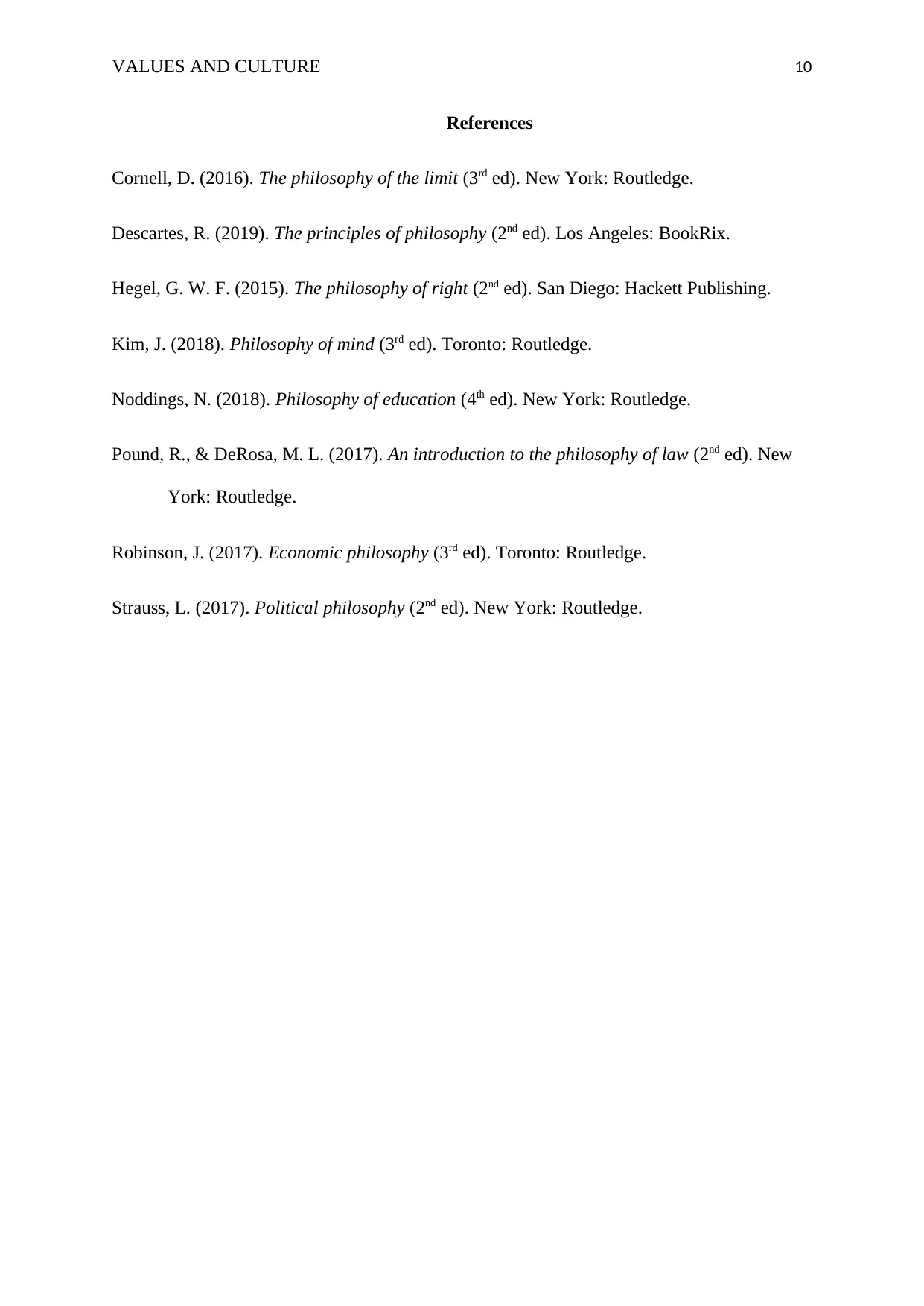
VALUES AND CULTURE 10
References
Cornell, D. (2016). The philosophy of the limit (3rd ed). New York: Routledge.
Descartes, R. (2019). The principles of philosophy (2nd ed). Los Angeles: BookRix.
Hegel, G. W. F. (2015). The philosophy of right (2nd ed). San Diego: Hackett Publishing.
Kim, J. (2018). Philosophy of mind (3rd ed). Toronto: Routledge.
Noddings, N. (2018). Philosophy of education (4th ed). New York: Routledge.
Pound, R., & DeRosa, M. L. (2017). An introduction to the philosophy of law (2nd ed). New
York: Routledge.
Robinson, J. (2017). Economic philosophy (3rd ed). Toronto: Routledge.
Strauss, L. (2017). Political philosophy (2nd ed). New York: Routledge.
References
Cornell, D. (2016). The philosophy of the limit (3rd ed). New York: Routledge.
Descartes, R. (2019). The principles of philosophy (2nd ed). Los Angeles: BookRix.
Hegel, G. W. F. (2015). The philosophy of right (2nd ed). San Diego: Hackett Publishing.
Kim, J. (2018). Philosophy of mind (3rd ed). Toronto: Routledge.
Noddings, N. (2018). Philosophy of education (4th ed). New York: Routledge.
Pound, R., & DeRosa, M. L. (2017). An introduction to the philosophy of law (2nd ed). New
York: Routledge.
Robinson, J. (2017). Economic philosophy (3rd ed). Toronto: Routledge.
Strauss, L. (2017). Political philosophy (2nd ed). New York: Routledge.
1 out of 10
Related Documents
Your All-in-One AI-Powered Toolkit for Academic Success.
+13062052269
info@desklib.com
Available 24*7 on WhatsApp / Email
![[object Object]](/_next/static/media/star-bottom.7253800d.svg)
Unlock your academic potential
Copyright © 2020–2025 A2Z Services. All Rights Reserved. Developed and managed by ZUCOL.





